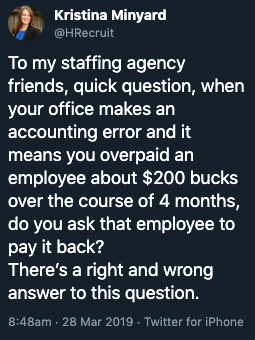In the past three weeks, I’ve been pitched by some well-meaning PR person about a story on how Google, Salesforce, Zappos, Airbnb, etc., have “Chief Happiness Officers” and how important they are to corporate success. Or at least, how “Happiness” as a measure is important to corporate success.
I’ve been pitched this idea four times, primarily so I would talk about their client, Snappy, which apparently is a chatbot of some kind that asks your employee questions to probably gauge their happiness or something, and in turn, you can then turn to your Chief Happiness Officer to fix the happy that is broken. (BTW – look for my new book in 2020 – “Fix the Happy!”)
Snappy might be some awesome tech, but I don’t like the pitch. I think that pitch is broken, for the real world. The real world is not Google and Zappos. Those are unicorns. Real companies have real issues and making their entitled employees happy is not one of those real issues.
I want to punch every Chief Happiness Officer in the smiling face!
Seriously, how completely warped do you have to be to think you actually bring happiness to another human being, let alone an entire company of human beings!?!
Will Smith is my Chief Happiness Officer:
Turns out CHO’s don’t make employees happy. Employees make themselves happy. No amount of money, or time off, or Taco Tuesdays, or standup desks or seven flavors of Kombucha in the employee cafe, will make a person happy. Happiness is an emotion controlled by the individual, no matter the environment they’re in.
There are great stories of prisoners at Auschwitz that chose love and happiness in the darkest hours and circumstances that anyone could imagine. There are people who win $500M lotteries that blow their head off because of how depressed they are. A CHO can’t change that.
Chief Happiness Officers are what happens to organizations when leadership gets out of control. When we stop actually leading and managing the business, and we ‘become’ leaders. When we start believing our own bullsh*t to a level where we think we actually control the emotions of our employees.
Look, I get it. I also want to drink the Kool-aid and believe in Santa Claus. Wouldn’t that be a wonderful, fantasy-filled life?! But that is life. 99.99% of us have to work to pay bills. Within that, we can choose to be happy, or miserable, or somewhere in between and that actually might have many times in the same day. No one person is going to make me happy or miserable unless I make that choice to allow that to happen.
There you go. That’s my take. Chief Life Officer, out.

